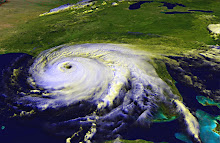"What radio should I buy for my hurricane safety kit?"
When that question came up, I was surprised. I thought buying a radio was a pretty simple thing. Then I realized some of the complications.
WEATHER BAND RADIO
A weather radio receives alerts from the National Ocean and Atmospheric Administration (NOAA). This is great if you want to hear tornado watches or warnings, flood advisories, and statements from the National Hurricane Center. The computerized voice can be a little difficult to understand sometimes; at least it was the last time I listened to my weather radio. I had mine on during the last hurricane and got really irritated with flood warnings out of Mobile, Alabama. It's a really low-lying area. They have major flooding issues every time it rains. A programmable weather radio is supposed to let you receive only the warnings, watches, alerts and advisories relevant to your area, but I thought I had mine set right. The local NWS office is in Mobile, so I don't think there's a way to stop the flood advisories. It was too much for me, so I turned it off until it was time for the next hurricane update. These start at $15 to $20.
AM/FM
The radio stations you like to listen to in your car are either on AM or FM. In my area, when a hurricane is coming, the television stations will go into 24 hour mode -- all hurricane, all the time -- and some of the stations will simulcast the TV signal. That way, if your power and/or cable goes out, you can still get information over any AM or FM radio. You can get a decent AM/FM radio with a small telescoping antenna for $8 to $12 at department stores or online. Try it out at home and make sure you can pick up a variety of local stations loud and clear.
COMBO
You can get radios that pick up AM/FM stations and NOAA, for about the same price or a little more than buying a weather band radio alone.
CONSIDER THE (POWER) SOURCE
Most portable radios are powered by batteries. Always check your batteries at the beginning of hurricane season and make sure you have extras on hand. Never store batteries in the radio. They burst or leak acid over time. Trust me. I know from experience. You can store batteries in the refrigerator and they'll last longer, but be sure to let them warm up to room temperature (and dry off any condensation) before putting them into your electronic device.
Many radios are now available that use alternate sources of power. These are fantastic if you have a long-term power outage. You won't have to worry about replacing or recharging batteries. Here are some of the options:
SOLAR POWER - These usually require several hours of exposure to direct sunlight to recharge. This is perfect if the weather is clear and sunny, and if you have a window that gets full sunlight all day. I was not comfortable leaving my solar radio sitting outside all day while I was at work.
DYNAMO-HAND CRANK - These are the type that you basically wind-up. You can wind for a couple of minutes and get enough power for a weather forecast. You do have to crank for some time to get a full charge.
ALTERNATE SOURCES - Rarer types of battery-free radios (and flashlights) will let you shake the item or use a sort of "squeeze pump" handle to generate power. I have a flashlight with the squeeze handle, and I prefer it over the hand-crank variety. I haven't tried the shake-it-up type.
If you need a cheap radio in a hurry, any battery-operated radio that will pick up AM and/or FM stations in your area should work. Again, be sure to test the radio and make sure you can get clear signals from several local stations or return it to the store and start over. If you can't pick up anything clearly in good weather, you sure won't be able to get important information during heavy wind and rain or after several towers get blown down in the storm.
Finally, check with your local TV and radio stations to find out who will simulcast in an emergency. Around here, several of the TV stations put out hurricane prep guides and they list reliable sources of information. In my area, we have one radio company that is locally owned; they operate two stations, and they provide really good around-the-clock coverage during disasters. The big national-conglomerate-owned stations are typically the ones who'll simulcast one of the local TV stations.
Sunday, June 19, 2011
Subscribe to:
Post Comments (Atom)



No comments:
Post a Comment